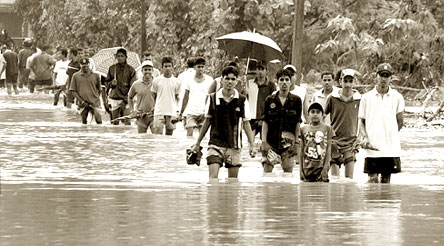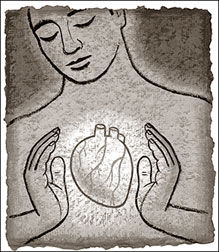
Beware of water borne diseases
By Rosanne Koelmeyer Anderson
Subsequent to the recent floods which caused havoc in several areas
around the country, the outbreak of food and water borne diseases too
have been on the increase. The reported cases of diarrhoea, dysentery,
viral hepatitis, typhoid and leptospirosis have shown a significant rise
especially in the flood affected areas.
 Experts of the Epidemiological Unit of the Ministry of Healthcare and
Nutrition have stipulated that the only way of overcoming this situation
is by following instructions given by the health authorities and taking
the necessary precautionary measures. Negligence would lead to
unwarranted circumstances, the public is warned. Experts of the Epidemiological Unit of the Ministry of Healthcare and
Nutrition have stipulated that the only way of overcoming this situation
is by following instructions given by the health authorities and taking
the necessary precautionary measures. Negligence would lead to
unwarranted circumstances, the public is warned.
Speaking to the Sunday Observer, Dr. Jagath Amerasekera, Medical
Officer of the Epidemiology Unit Colombo said the repercussions of the
recent flood which affected many districts had been manageable as the
health infrastructure and the media had played a vital role in curbing
the spread of water borne diseases.
The public should be educated on the precautionary measures they
should take before and after a flood and especially while the water is
receding. Strengthening the surveillance system of communicable diseases
in flood affected areas is the function of the Epidemiology Unit, he
explained.
Serious issue
During torrential rain and floods the dirt, garbage and faecal
matter gets deposited especially in the wells contaminating the water
source of many households which invariably leads to contracting a water
borne disease. The incubation period of diseases vary from 3-30 days.
The incubation period of dysentery would be about 3 days while in the
case of Hepatitis A the incubation period would extend to 28-30 days.
Hence, the predominance of some of the water borne diseases are at high
risk, Dr. Amerasekera explained.
Flooding of toilets into the front and back yards where raw leaves
and leafy vegetables are grown is yet another contributory factor.
Contaminated water sources and food is best avoided in these
circumstances. Consumption of boiled and cooled drinking water is a
must.
After a flood it is best that all well are cleared, cleaned and
chlorinated well removing all garbage debris using proper methods before
re using. Experiencing vector borne diseases such as dengue and
chickungunya a week or two after a flood is also common.
The flood affected areas were Ratnapura, Kalutara, some parts of
Colombo, Galle, Matara and Kegalle in particular where there were a
number of cases of skin disease reported too. The availability of active
surveillance and mobile clinics were beneficial aspects in these areas.
Meanwhile, Dr. Risintha Premaratne, Consultant, Epidemiology Unit of
the Ministry of Healthcare and Nutrition speaking on the prevalence of
hepatitis stated that the disease can be caused by several factors
including viruses, drugs, chemicals and alcohol.
Alcohol was one of the most significant contributory factors denoting
inflammation of the liver. Five viruses have been identified with
Hepatitis. The commonest being Hepatitis A and Hepatitis E which are
transmitted through food and water borne diseases while Hepatitis B,
Hepatitis C and Hepatitis D are transmitted through the blood and body
fluid.
Vulnerable
In 2007, 5885 cases of viral hepatitis were reported (on suspicion)Â
from the Gampola and surrounding areas. The outbreak of viral Hepatitis
has been constant in the Kegalle district over the years. Notably, every
five years there has been an outbreak of Hepatitis A due to
susceptibility.
At present, Hepatitis A has been spreading in outbreak proportions Â
in the Sabaragamuwa Province in Mawanella and Aranayake. Hepatitis A
causes a high risk as the incubation period is around 28-30 days and
could extend to even 45 days before it is diagnosed.
The danger is that Hepatitis A is infectious. It is an infection of
the liver which can easily spread from person to person and children are
more vulnerable. Stools cause the spread of the Hepatitis virus by the
faecal-oral route.
Always drinking boiled and cooled water is a must. Keep cooked food
covered and consume home cooked food. Wash fruits thoroughly before
eating and leafy vegetables should be well cooked.
Dispose garbage properly to prevent flies from breeding. Using
something contaminated or failure on the part of an infected person to
wash himself thoroughly after toilet use could cause the spread of
Hepatitis A. A vaccine is available for the prevention of Hepatitis A.
The symptoms of Hepatitis A could vary in clinical severity from a
mild illness lasting 1-2 weeks to a severely disabling disease lasting
several months. Fever, fatigue, loss of appetite, stomach pain,
diarrhoea, nausea and jaundice are common symptoms of Hepatitis A which
could be diagnosed by a blood test. The test could also differentiate
between a current infection and a past one while there are other blood
test which could find the extent of damage caused to the liver.
Meanwhile, Dr. Navaratnasingam Janakan also a Consultant
Epidemiologist of the Epidemiology Unit, Ministry of Healthcare and
Nutrition speaking on the incidence of leptospirosis which was rapidly
spreading as a result of the recent floods states that during the past
two weeks reports show that leptospirosis is on the decrease although
during the latter part of May there was a significant number of cases
reported from the Matale district. In 2007, 2195 cases were reported to
the Epidemiology Unit.
Up to May 16, of a total of 1700 reported cases 51 deaths have been
reported from  Anuradhapura, Ratnapura, Hambantota and Moneragala.
There is a direct correlation between the amount of rainfall and the
incidence of leptospirosis. The necessity of strengthening prevention
activities at primary, secondary and tertiary level is vital.
Exposure to contaminated water and soil should be avoided.
However for  those engaged in agriculture, gemming sewage work and
work which involves direct contact with waterways it is inevitable. The
risk is very high in such instances. Such persons are advised to wear
protective footwear and clothing and cover all abrasions with waterproof
dressing.
MOH officers should be notified of all high risk groups. Doxycycline
on a regular basis during the period of exposure is recommended.
However, children below 12 years of age, pregnant and lactating mothers
should not be given Doxycycline, Dr. Janakan states.
De-stress in 5 minutes or less
Lighten up: When the body absorbs sunlight, it enhances the effect of
mood-stabilizing chemicals like serotonin. Catch some rays, whether by
moving playdates outside or parking your car a little farther from a
store so you have to walk a ways to get where you’re going. In the
winter, throw open the curtains during the day.
 Take a (virtual) vacation: “I close my eyes and visualize being on a
luxury ocean liner,” says Alisha Bush, a mom of one in Madisonville,
Tennessee. “I feel the rhythm of the waves and inhale the smell of the
ocean.” Take a (virtual) vacation: “I close my eyes and visualize being on a
luxury ocean liner,” says Alisha Bush, a mom of one in Madisonville,
Tennessee. “I feel the rhythm of the waves and inhale the smell of the
ocean.”
Jump rope: It’s not just for third-grade recess anymore. Jumping rope
for 20 minutes triggers your body to release feel-good endorphins, and
its repetitive motion makes you relaxed and focused, says Patricia
Arcari, Ph.D., director of the Calm Mother, Happy Child program at
Massachusetts General Hospital. Grab your kid and see who can go the
longest.
Crank up some tunes: Play music that brings up good memories. “Many
people find they have a visceral reaction to something they heard in
their youth,” says Suzanne Hanser, chair of the Music Therapy Department
at Berklee College of Music, in Boston, Massachusetts. Choose anything
that triggers a positive image, like your wedding-dance song or the
music that played during a first date or at the first rock concert you
went to as a teenager.
Breathe deeply: “ I touch my middle finger and thumb together on each
hand to signal to myself that I should stop what I’m doing and take a
deep, cleansing breath,” says Sharon Wren, a mom of two in East Moline,
Illinois. “It sounds goofy, but it works. You can do it wherever you are
- in the grocery store or even at a parent-teacher conference.”
Say your CBA’s: “When I’m upset, I recite the alphabet backward,”
says Ann Eide, a mom of one in Columbus, Mississippi. “I really have to
concentrate on the letters, so by the time I get to ‘P,’ I’ve forgotten
what was bothering me.”
Connect with a grown-up: Social support is one of the most effective
coping mechanisms we have when we’re feeling anxious and stressed, say
experts. If you can’t reach a friend on the phone, send a quick message.
Turn the world upside down: “I lie across several stairs upside
down,” says Annette Nikolich, a mom of two in Lake Barrington, Illinois.
“I’m not sure how it started - I think I probably just collapsed one
evening after chasing a preschooler and a toddler all day.
It must have something to do with all that blood rushing to my head,
but since then, whenever I’m going insane, a few minutes upside down on
the stairs totally changes my outlook and mood.”
Laugh it off: Numerous studies show that laughter lowers your levels
of cortisol, which is a stress hormone. So go ahead and giggle out loud
at your husband’s bad knock-knock jokes - it’ll make you both feel good.
Get busy in bed: Having sex releases endorphins that improve your
mood and decrease symptoms of stress. (No instructions needed.)
Spritz off stress: “I use lavender essential oil to get calm,” says
Marguerite Wright, a mom of four in Dixmoor, Illinois. “I put it in a
plug-in diffuser or add a few drops to distilled water in a spray bottle
and spritz it on myself, the kids, and all over the house.”
Rub the right way: No, we’re not talking about getting a massage;
we’re talking about *giving* one - to your baby.
Research shows that when women massage infants, their levels of the
stress hormone cortisol drop, which in turn calms them down, says
Tiffany Field, Ph.D., director of the Touch Research Institute at the
University of Miami School of Medicine.
Before putting on your baby’s pj’s, dab a few drops of baby oil onto
your fingers and give her a rubdown. If you’re unsure of your technique,
don’t worry. “Moms know instinctively how to massage,” says Field.
Six ways to avoid dying of a surprise heart attack
The facts are scary: Despite the progress made against heart disease
in the past several decades, almost half the people who die suddenly
from a heart attack or other cardiac problem have no prior symptoms.
 Even knowing someone’s risk factors for heart disease, it’s often
tough to pinpoint who will actually go on to get the disease. And once
blood flow to the heart muscle is blocked and a heart attack happens,
it’s not exactly clear why some people experience sudden cardiac arrest
which killed *Meet the Press* host Tim Russert recently, and others
don’t. Even knowing someone’s risk factors for heart disease, it’s often
tough to pinpoint who will actually go on to get the disease. And once
blood flow to the heart muscle is blocked and a heart attack happens,
it’s not exactly clear why some people experience sudden cardiac arrest
which killed *Meet the Press* host Tim Russert recently, and others
don’t.
Those uncertainties, however, don’t mean that you are powerless to
protect yourself from dying of a heart attack. Here are steps to take to
improve your odds:
1. Follow the standard prevention guidelines.
The American Heart Association has three basic tips for preventing
heart disease, stroke, and heart attack. Don’t smoke, be more active,
and make good nutritional choices. This is good general health advice,
regardless of your heart disease risk.
2. Exercise.
Yes, we mentioned it above, but it’s worth repeating.
“Exercise raises good cholesterol and lowers bad cholesterol”, says
Rob Michler, director and chairman of heart surgery at the Montefiore-Einstein
Heart Center in New York. Worrying that exercise is going to give you a
heart attack is not a valid excuse for skipping it; while it’s true that
exercise raises your odds of a heart attack in the moment, the long-term
benefits vastly outstrip this short-term risk. (Still, check with your
doctor first if you’re obese, have health problems, or haven’t exercised
in years.)
3. Know your risk
Find out your Framingham risk score, which gives the odds of heart
attack or heart disease-related death in the next 10 years. It requires
you have certain basic information, like your cholesterol numbers and
blood pressure.
This score isn’t perfect, especially for young people and for women,
who can find alternative ways to gauge risk, but it’s a good place to
start. Talk to your doctor about your risk score, and do something about
what is controllable, like your weight or tobacco habits.
“Recognize when you have a risk and modify that risk as much as you
can,” says Steve Owens, a cardiologist at the University of Kansas
Hospital in Kansas City, Kan.. If your odds of heart disease are high
enough, talk with your doc about the pros and cons of medications like
statins or aspirin.
4. Get a family history
“Your genetic profile is the one risk factor we can’t modify,” says
Michler. But if you have a family history of early-onset heart disease,
tell your doctor even if you’re in perfect health yourself.
If your father had a heart attack at 40 (even if he survived it),
that’s crucial information about your possible genetic risk.
5. Know the symptoms of heart problems
It’s not just crushing chest pain.
U.S. News wrote recently about how to know if you’re having a heart
attack and what to do about and also looked at how women may not be
alert to the signs of heart disease.
6. Learn CPR. Clearly, you can’t perform it on yourself, but you can
help someone around you who is experiencing cardiac arrest. “If people
can make it until EMS arrives, then their chances of survival are
wonderful,” says Judith Hochman, clinical chief of cardiology at New
York University, who says she’s seen three recent cases of patients
saved by CPR.
The American Heart Association says it improves survival two to
threefold and recently urged laypeople to learn how to do it. And it
needn’t be complicated: Chest compressions alone can help heart attack
victims. Meantime, if you’re in a public space like a gym or casino when
someone has an attack, look for an automated external defibrillator,
Hochman advises. |
